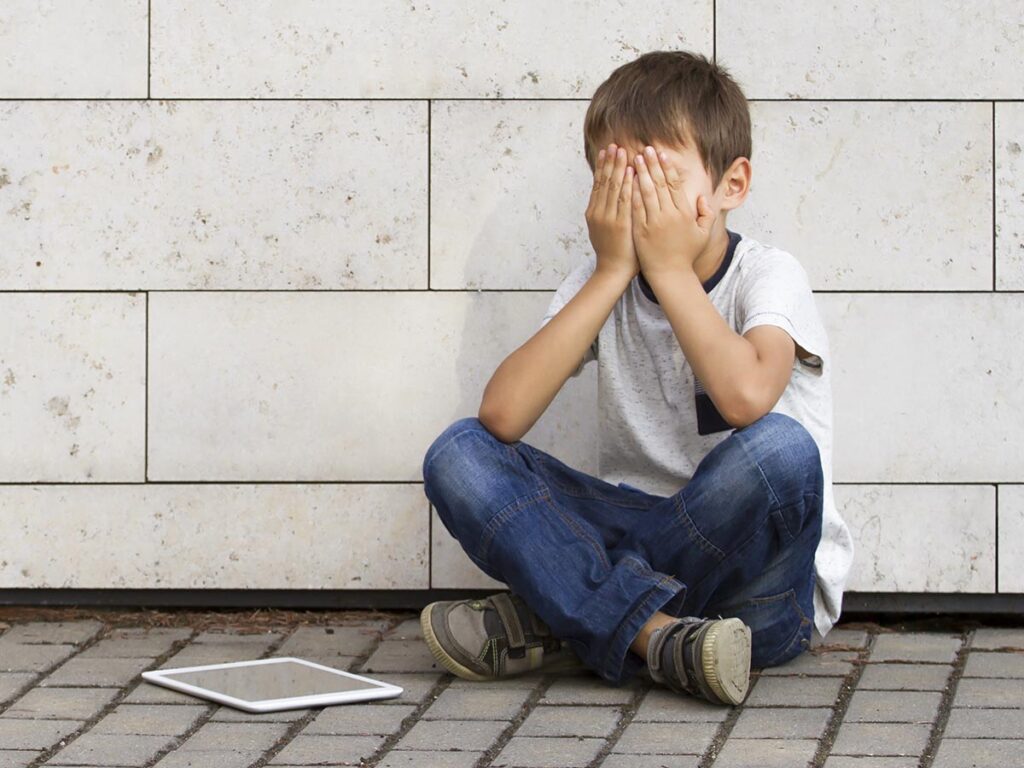Child & Youth Counseling

Child and youth counseling provides a supportive and nurturing space where trained therapists work with young individuals to address emotional, behavioral, and developmental challenges. It focuses on helping children and adolescents navigate issues such as anxiety, depression, trauma, grief, academic stress, peer relationships, and family dynamics. Therapists use age-appropriate techniques like play therapy, art therapy, and cognitive-behavioral strategies to encourage self-expression, build coping skills, and promote positive growth. The process emphasizes building trust and rapport with the young client, creating a safe environment for them to explore their feelings and experiences. Child and youth counseling aims to empower young individuals to overcome difficulties, enhance resilience, and develop healthier ways of interacting with themselves and others, fostering emotional well-being and overall growth.
Some Facts

Anxiety in Youth
Feeling anxious is a human experience that, in moderation, keeps us safe and can even motivate us. When anxiety is experienced excessively it becomes a debilitating force in our lives. This is no different for children and youth.
It’s common for young children to be fearful of things that adults might easily dismiss, such as the dark and monsters lurking under the bed. However, if you notice your child’s inability to have fun, interact with others, or behave in a manner typical for their age, then perhaps your child may be struggling with anxiety.
Depression in Youth
Depression is normally associated with adults. We tend to view children as joyous and carefree – how could they possibly get depressed? Of course, children experience a wide arrange of emotions just like adults, and they often find it difficult to express their feelings depending on their age and stage of development. Children and teens may express their emotions differently and their emotions may seem heightened compared to adults, who may have learned to regulate (or hide) their emotions better. However, children and youth can, and do, experience depression and they too can experience sadness, hopelessness, and despair, like adults.


Preparing Children for Therapy
Choosing to support your child by having them see a psychologist is another way to express your love for them and that you want them to be happy and fulfilled. It’s important to prepare them for the appointment rather than just showing up at the office. Choose a quiet time to explain that you have made an appointment with a psychologist or therapist for them because you care about them and love them and answer any questions they may have or ease any anxiety they may feel.
Self-Esteem Issues
Self-esteem in a nutshell is what you think of yourself, how much respect you have for yourself, and how capable, loveable, and worthy you feel. Self-esteem issues can go either way – some sufferers have a very low sense of self-worth or low self-esteem, while others have an overly inflated sense of self-worth, also known as narcissism. In either case, if you or your child has these issues, it’s likely you have a hard time relating to others, and may suffer in the workplace, in school, or in general life because of them.


Children's Mental Health
Life can have challenges for people of all ages – including kids. Children as young as 4 or 5 (and even younger) can show signs of mental health challenges. A variety of conditions and concerns may prompt you to seek help for your young child. Dealing with minors is different from treating adults. In the past, children were simply perceived as smaller versions of adults. This way of thinking did not contribute to their development, but thankfully psychologist Jean Piaget pioneered child psychology and confirmed that indeed – children think differently from adults. It’s important that parents adapt this way of thinking and consider that their children have different needs based on their age. Children see the world from another perspective and face many challenges for the first time. I
Issues Related to Bullying
Unfortunately, bullying continues to be an all-too-common occurrence in schools, online, and sometimes workplaces, and can have a lasting impact for the victim or survivor. Enduring bullying can affect a person’s mental health – whether they are a child or an adult. Repeated intimidation can really wear a person down and impact all areas of life.


Frequently Asked Questions
Counselling is a process between an individual and their counsellor that helps the individual to overcome difficulties and change maladaptive or unhealthy emotional, behavioural or cognitive aspects. This leads to a more adaptive pattern of thought and behaviour and a satisfactory change in the individual. Thus, Counselling is an enabling process that provides alternative ways to think, feel and behave in a healthier manner.
It is a common myth that, Counselling is only for people who are very disturbed. In fact, counselling can be helpful for any person, who can think, feel and behave appropriately most of the times but sometimes, may require help to enhance, develop, change or improve his/her condition. Students, working professionals, couples, parents may seek counselling for different issues.
When a person experiences negative emotions such as sadness, hopelessness, frequent worrying, difficulty in daily functioning for a significant period of time and cannot cope with it, then they can visit the Counsellor by taking a prior appointment. Some of the concerns with which people approach a counsellor are prolonged sadness, worry, anxiety, indecisiveness, anger, lethargy, procrastination, addictions and so on.
Any concern or experience, from an everyday concern to a unique circumstance or situation can constitute a reason to seek help from a Counsellor. Counselling addresses concerns across many life stages, events and circumstances.
Common reasons why students have sought counselling include:
- Relationship difficulties such as frequent fights, extramarital affairs, sexual worries, loss of intimacy
- Academic problems, procrastination, difficulty keeping to deadlines, low confidence
- Distress related to peer relationships, dealing with rejection
- Illness, grief and loss
- Life transition and adjustment issues
- Personal growth and understanding
- Addiction related issues
- Sexuality and gender identity
- Anxiety, Depression, Stress
- Decision related to marriage and commitment
- Separation or divorce
- Loneliness
- Violence and abuse in relationship
Only your counsellor would know of this. For all those who seek counselling, confidentiality is maintained regarding their personal information, which is not disclosed to any person, group or authority without his/her consent. In case of emergency such as, when someone is feeling overwhelmed and maybe suicidal, the person listed as their emergency contact will be reached.
Sometimes a counsellor may share details about a session or a client with a team member or their supervisor to gain clarity, and seek suggestions on the way forward. This is done without divulging personal details of the client such as their name, course in which they are studying etc. It is done for enhancing to quality of the service and for the benefit of the client. This is termed as shared confidentiality.
Counselling is a process in which the individual and the counsellor work towards a common goal which is beneficial for the individual. This can lead to a satisfactory and beneficial change in the thoughts, feelings and behaviour of the individual. It can enable them to cope with unmanageable situations in the best way possible. The process helps to enhance the overall well-being of the individual.
The duration of the Counselling process differs for each individual. It depends on the complexity of the concerns that the individual has and his/her participation in the process. On an average, counselling sessions can extend between 2-6 sessions.
